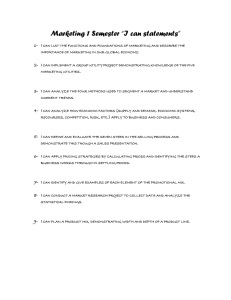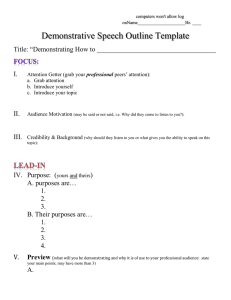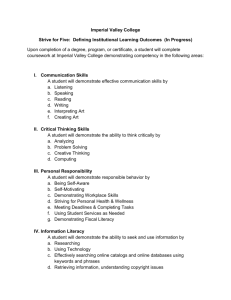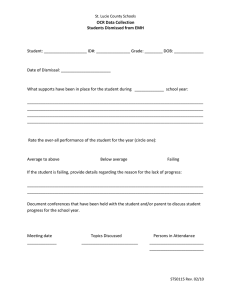Regulations for Student Rewards and Punishments at I-Shou University
advertisement
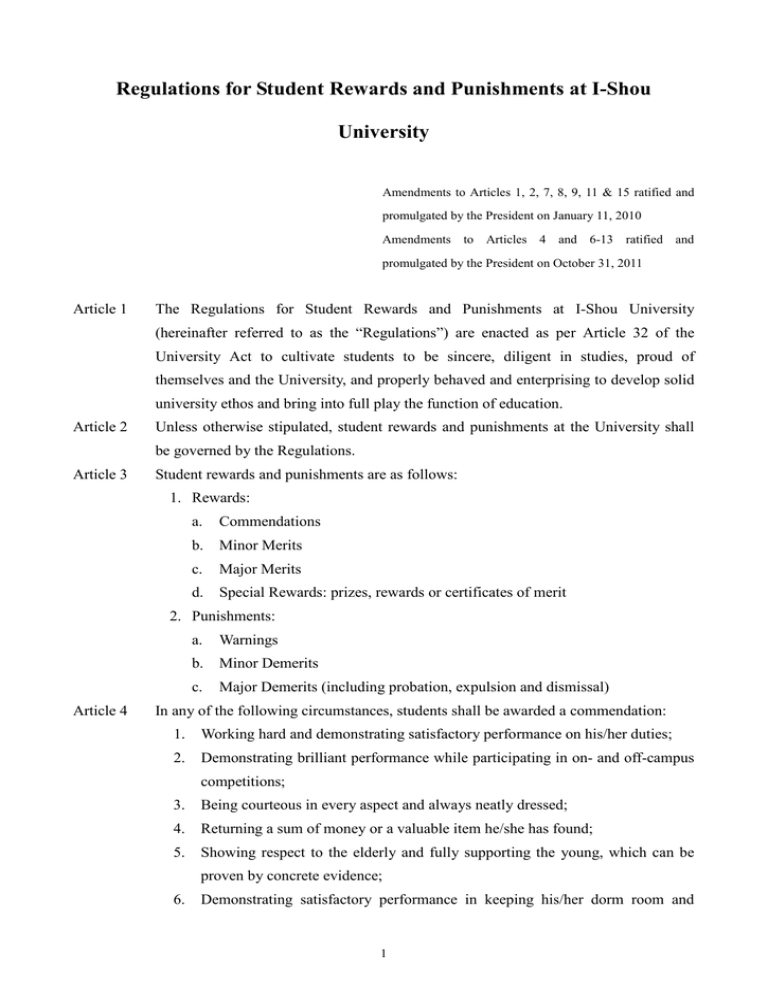
Regulations for Student Rewards and Punishments at I-Shou University Amendments to Articles 1, 2, 7, 8, 9, 11 & 15 ratified and promulgated by the President on January 11, 2010 Amendments to Articles 4 and 6-13 ratified and promulgated by the President on October 31, 2011 Article 1 The Regulations for Student Rewards and Punishments at I-Shou University (hereinafter referred to as the “Regulations”) are enacted as per Article 32 of the University Act to cultivate students to be sincere, diligent in studies, proud of themselves and the University, and properly behaved and enterprising to develop solid university ethos and bring into full play the function of education. Article 2 Unless otherwise stipulated, student rewards and punishments at the University shall be governed by the Regulations. Article 3 Student rewards and punishments are as follows: 1. Rewards: a. Commendations b. Minor Merits c. Major Merits d. Special Rewards: prizes, rewards or certificates of merit 2. Punishments: Article 4 a. Warnings b. Minor Demerits c. Major Demerits (including probation, expulsion and dismissal) In any of the following circumstances, students shall be awarded a commendation: 1. Working hard and demonstrating satisfactory performance on his/her duties; 2. Demonstrating brilliant performance while participating in on- and off-campus competitions; 3. Being courteous in every aspect and always neatly dressed; 4. Returning a sum of money or a valuable item he/she has found; 5. Showing respect to the elderly and fully supporting the young, which can be proven by concrete evidence; 6. Demonstrating satisfactory performance in keeping his/her dorm room and 1 personal belongings neat and tidy; 7. Being a good example of protecting university properties and using public properties with care, which can be proven by concrete evidence; 8. Article 5 Demonstrating other outstanding deeds which merit a commendation. In any of the following circumstances, students shall be awarded a minor merit: 1. Demonstrating remarkable performance on his/her duties and showing great enthusiasm for public welfare; 2. Being proactive in helping and fully supporting classmates, which can be proven by concrete evidence; 3. Demonstrating remarkable performance on his/her duties while serving as a cadre member; 4. Returning a considerable sum of money or an item of great value he/she has found and being commended by government agencies; 5. Performing a heroic act disregarding risks to serve or rescue others, which can be proven by concrete evidence; 6. Demonstrating remarkable performance while representing the University in off-campus events or competitions, and lending the University a good reputation; 7. Article 6 Demonstrating other outstanding deeds which merit a minor merit. In any of the following circumstances, students shall be awarded a major merit: 1. Demonstrating extraordinary performance which is beneficial to the nation and the society, which can be proven by concrete evidence; 2. Demonstrating extraordinary performance on his/her duties while serving as a cadre member of a student club or a student self-governed organization, and making great contributions to developing solid university ethos; 3. During his/her studies at the University, making an invention or publishing a peer-reviewed paper of great importance, either of which is beneficial to the nation and the society; 4. Performing an extraordinarily heroic act disregarding risks to serve or rescue others, and being commended by government agencies; 5. Demonstrating extraordinary performance while representing the University in national competitions, and lending the University a good reputation; 6. Demonstrating other outstanding deeds which merit a major merit upon approval of the Student Reward and Disciplinary Committee. Article 7 In any of the following circumstances, students shall be assigned a warning: 1. Failing to attend routine assemblies or activities without legitimate reasons; 2 2. Failing to keep an appointment with the advisor or other teachers without legitimate reasons; 3. Failing to selecting courses or apply for credit transfer in accordance with university regulations; 4. Wearing clothes that violates good social customs while on campus; 5. Attempting to avoid his/her duties without legitimate reasons and doing harm to public welfare; 6. Being delinquent while serving as a cadre member at the University; 7. Failing to keep his/her dorm room and personal belongings neat and tidy; 8. Being indiscretionary and misbehaved, leading to harm to public welfare; 9. Disturbing public order in public or failing to turn the cell phone off while attending a class; 10. Failing to use public properties with care or save water and energy; 11. Violating traffic regulations while driving or riding a motorcycle; 12. Littering or smoking in a non-smoking area; 13. Disturbing working dogs on campus; 14. Assuming another student’s identity to answer a roll call in class; 15. Demonstrating other deeds which deserve a warning. Article 8 In any of the following circumstances, students shall be assigned a minor demerit: 1. Insulting teachers or anyone performing official duties; 2. Bullying classmates or attacking others by revealing their past misdeeds; 3. Damaging public properties on purpose; 4. Destroying announcements or official documents issued by the University; 5. Attempting to avoid his/her duties without legitimate reasons and doing harm to public welfare, and having no regrets; 6. Being dishonest or deceiving university officers or teachers; 7. Disturbing group order and failing to be amenable to persuasion, thus making himself/herself a nuisance to others or disturbing social order; 8. Violating any of the regulations and rules with respect to the dormitories; 9. Keeping mahjong tiles or other gambling paraphernalia at the dormitory (violators will be disciplined more harshly if found to have used such gambling paraphernalia); 10. Violating exam regulations; 11. Failing to wear a helmet while riding a motorcycle or being caught with improper driving behavior for three times; 12. Falsely using others’ identity documents or allowing others to falsely use 3 his/her identity documents; 13. Failing to complete the registration procedures by a given deadline after informed for the first time; 14. Infringing upon intellectual property rights, but there is nothing to do with exchange or transfer of interests; 15. Sexually harassing others, which proves true by the Committee for Gender Equity Education; 16. Mistreating or harming working dogs or any other animals; 17. Conspiring to assume another student’s identity to attend a class for less than one-third of the total class hours during a semester; 18. Demonstrating other deeds which deserve a minor demerit. Article 9 In any of the following circumstances, students shall be assigned a major demerit or put on probation: 1. Deliberately damaging public properties and having no regrets; 2. Counterfeiting or altering documents or valid identity documents; 3. Getting drunk and rowdy or gambling; 4. Establishing a gambling website, introducing such a website to others, or entrapping others into gambling by means of such a website; 5. Behaving rudely, brawling or rioting; 6. Entering a restricted area while participating in an off-campus activity after a warning against typhoon, flood or landslide has been issued by competent authorities; 7. Failing to be amenable to persuasion in changing the time or place of an off-campus activity for the sake of safety; 8. Deliberately disturbing university administration and interfering with official duties; 9. Maliciously criticizing, insulting or assaulting teachers or anyone performing official duties; 10. Being found to have involved in a fraudulent practice or irregularity during exams; 11. Being found to have involved in plagiarism or a fraudulent practice or irregularity in his/her thesis (dissertation), creations, presentations, general reports or technical reports; 12. Infringing upon intellectual property rights and earning illegal profits; 13. Participating in a wrongful assembly/parade or illegal organization outside the campus; 4 14. Holding activities or changing activity details without prior consent, thus making himself/herself a nuisance to others or disturbing social order; 15. Engaging in instigation, riot or protest without prior consent, thus making himself/herself a nuisance to others or disturbing social order; 16. Disseminating false statements, resulting in damage to others’ rights and interests or the University’s reputation; 17. Dormitory residents are found to have accommodated visitors or taken visitors of the opposite sex into the dormitory; 18. Entering the dormitory area where residents of the opposite sex live without prior permission; 19. Failing to fulfill the duty of managing public funds or public properties, or inflating, misappropriating, wasting or embezzling public funds or public properties; 20. Disseminating information associated with pornography or violence, which violates good social customs or does harm to others’ reputation; 21. Failing to be persuaded out of engaging in direct selling on campus or being found to engage in direct selling; 22. Being found to be guilty of theft; 23. Establishing a profit-seeking website to engage in business practices, leading to damage to the University’s reputation; 24. Violating the Criminal Code and being sentenced by the court; 25. Sexually harassing others, which is deemed a serious violation by the Committee for Gender Equity Education; 26. Damaging or vilifying the national flag, the official name of the nation, the portrait of Dr. Sun Yat-sen, the photograph of the R.O.C. president, etc. 27. Disturbing, mistreating or harming working dogs or any other animals, causing injuries to other; 28. Conspiring to assume another student’s identity to attend a class for more than one-third of the total class hours during a semester; 29. Demonstrating other deeds which deserve a major demerit upon approval of the Student Reward and Disciplinary Committee. Article 10 In any of the following circumstances, students shall be expelled or dismissed: 1. Getting involved in extraordinarily serious violations associated with the circumstances referred to in the foregoing article, or repeatedly conducting the same wrongful deeds; 2. Assaulting teachers or anyone performing official duties with weapons; 5 3. Being subject to another disciplinary action during the probation; 4. Accumulating a total of three major demerits or receiving a failing conduct score; 5. Violating laws and regulations and being sentenced by the court, leading to great damage to the University’s reputation; 6. Getting involved in a fraudulent practice or irregularity during exams with another two persons or more; 7. Coercing someone else to or conspiring to assume another student’s identity to sit an examination; 8. Sexually assaulting others, which is deemed a serious violation by the Committee for Gender Equity Education; 9. A violation of R.O.C. laws and regulations by a student who is not an R.O.C. national and recognized by the Student Reward and Disciplinary Committee; 10. Demonstrating similar deeds which deserve expulsion or dismissal upon approval of the Student Reward and Disciplinary Committee. As for students violating Subparagraph 6 or 7, their punishments might be mitigated upon the approval of the Student Reward and Disciplinary Committee as long as they express their regret at what they have done. Article 11 Student rewards and punishments shall be governed by the following rules: 1. Commendations, merits, warnings and demerits shall be ratified and announced by the Dean of Student Affairs. 2. Major merits and major demerits or above shall become effective after adopted by the Student Reward and Disciplinary Committee and ratified and announced by the President. 3. The Student Reward and Disciplinary Committee shall have the right to make decision for any doubt about a reward or punishment. 4. The student concerned shall always be informed of his/her rewards or punishments both before and after an announcement. For major merits or minor demerits or above, in addition to an announcement, the University shall inform his/her parent(s) (or legal guardian), the advisor, and departmental counselor. Article 12 To help students subject to disciplinary action turn over a new leaf, they may apply for campus or community services to offset warnings or minor demerits ratified by the University. The rules are as follows: 1. Students may accumulate four hours of campus services to offset one warning. 2. Students may accumulate twelve hours of campus services to offset one minor demerit. 6 3. Major demerits or above shall not be offset by campus services unless an application for offset is approved by the Student Reward and Disciplinary Committee or ratified by the President. Article 13 During his/her studies at the University, rewards and punishments assigned to a student may be accumulated and offset each other. However, a commendation or merit rewarded to a student before is not permitted to be used to offset a demerit assigned to him/her later. Article 14 Students may file an appeal application to the Student Grievance Committee in accordance with the Regulations for Handling of Students’ Grievances by I-Shou University when they have objections against any reward or punishment assigned to them. Article 15 The Regulations become effective on the day of promulgation after adopted by the University Council, ratified by the President and reviewed by the Ministry of Education. Note: In the event of any disputes or misunderstanding as to the interpretation of the language or terms of these Regulations, the Chinese language version shall prevail. 7
